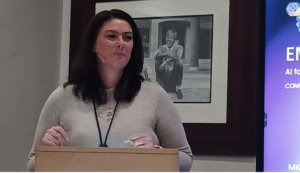

This is the word from Lee-Anne James, Africa lead for data and AI at Microsoft commercial solutions for Africa, speaking at the African SAP User Group (AFSUG) Womens’ Day event in Sandton today.
“The intention is not to take over the world, but to progress – closing divides and building on the shortcoming of the environments we live in,” she says.
“Robots are not going to take over, they are going to augment IT into our world; and we all need to be part of where it goes. We need to use them to bridge the divide to do more with less.”
There are many opportunities for women to use AI in the modern world, James says.
Modern women can leverage the technology to empower their own personal growth and the growth of others, enrich lives, and build connections.
To empower personal growth, AI can enhance skills and learning. There are a multitude of tools that are freely available to help people gain new skills .
She cites the example of studying at university: just a couple of decades ago, this would have involved sitting in lecture halls and ploughing through a pile of books. Today, AI can help with curating and summarising volumes of information. In addition, smart students can use AI to test out theories and pick up mistakes or areas where skills are lacking.
“So we can short-circuit the journey from no knowledge to knowledge,” James says.
“So make sure you are more deliberate around using keywords on digital platforms so you can personalise your learning journey.
“At the end of the day, it is about data, so garbage in, garbage out.”
Not only has the world of skills changed – and the nature of work – but the way we conduct interviews has changed as well.
James advises that AI can help to create the right resume for the right position. “And there are also some great apps that help people enhance how you do an interview.”
Work-life balance is a concept that many professional women battle with.
“The reality is that all of our lives are pretty chaotic. AI can help us advance abilities to manage some of the chaos.”
AI is infused into a lot of productivity applications, James points out. These include simple things like scheduling, design ideas and more, with automated assistance available.
Apps are available to assist in wellness too, with machine learning helping people to manage their wellness journeys.
“These tools help to reduce stress, and bring the chaos under control.”
AI can really come into its own to help people build connections.
“One of the more obvious areas is in removing barriers to language or physical impairments,” James says. “There are the obvious areas like call centres, but we can also use AI to increase our personal communication.”
She cites an example of image analysis use from Al Jazeera which uses cognitive services to pick up where potential war crimes, crimes against humanity, or crimes against women have occured.
“The opportunities are endless, help us to come together as communities, and bridge the digital divide.”
James, however, cautions that AI needs to be managed properly and used responsibly.
“Responsible AI should be at the heart of everything that we do. AI could present a new level of bias and threats, so we all need to be vocal about addressing those.”
There is still a long way to go in addressing bias, James adds. “But there are international communities that aim to review and manage bias. There are also tools available for corporates to remove bias from their systems. So we put the guard rails in place to make sure you are not using the technology for the wrong reasons.
“The fact that we are aware of the biases is a great start.”
This article first appeared on ITOnline.
